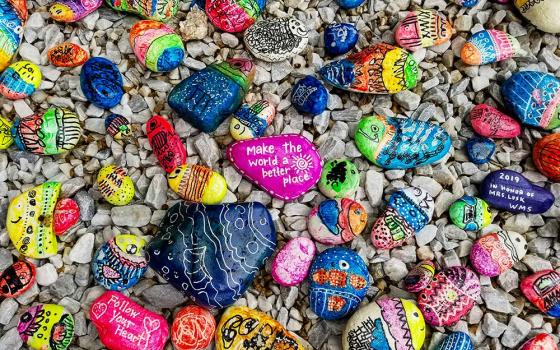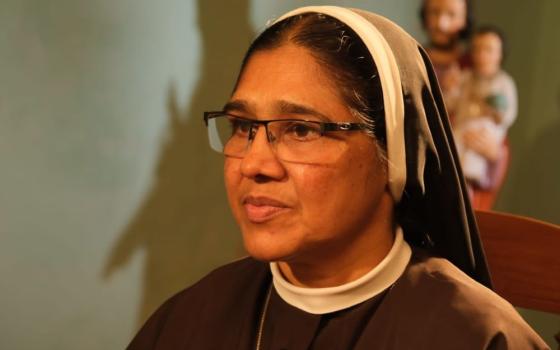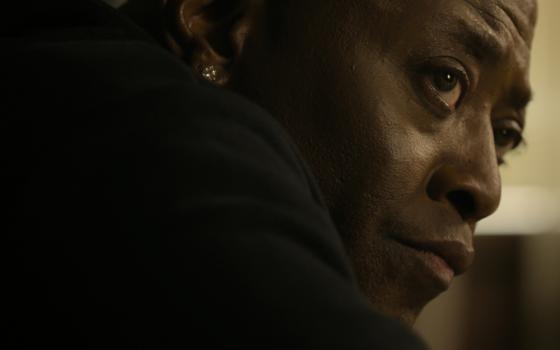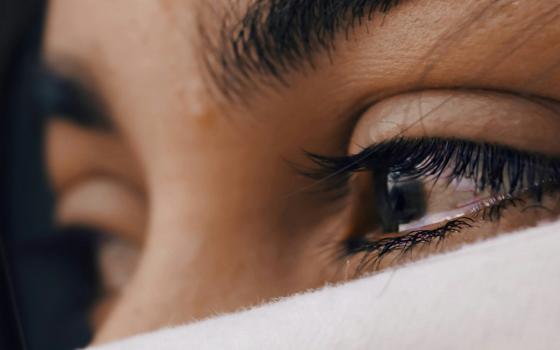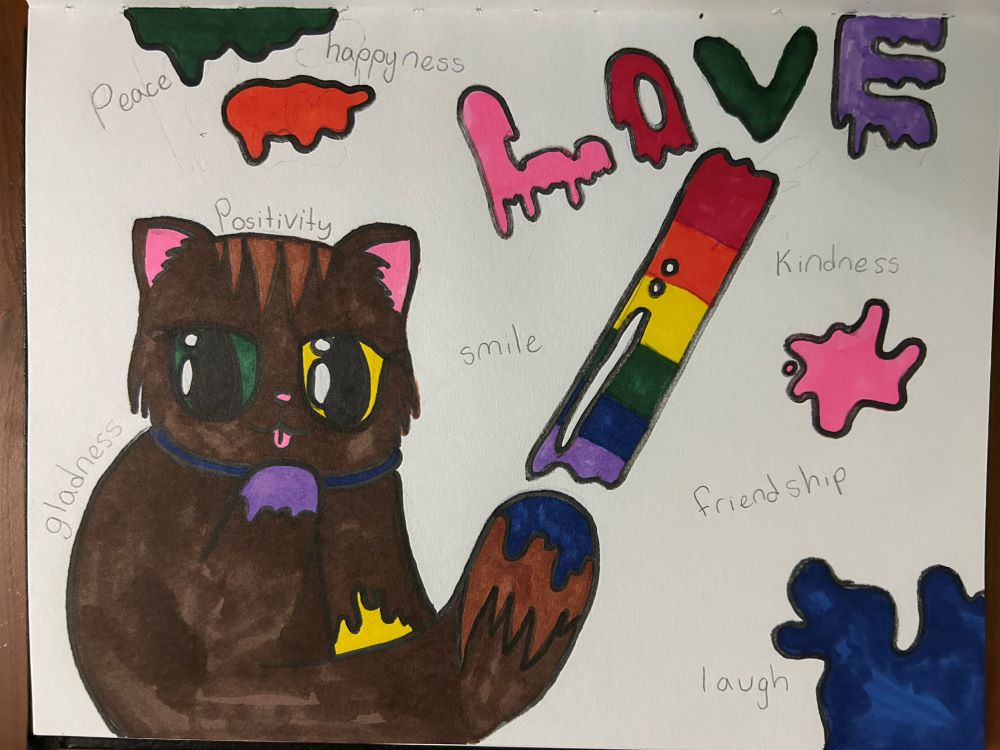
Millie Hooker created this artwork for the inauguration of Artistic Bridges on Golden Rule Day 2024, inviting other youth to participate. (Courtesy of Martha A. Kirk)
Matthew, about 5 years old, listened to my invitation to create "artistic bridges" and immediately began working diligently with crayons and markers. Finally, he announced: "This is a heart of love for all the children in the world."
At the summer camp in one of the most disadvantaged neighborhoods of our city, I showed the children a webpage in many languages inviting young people to create Artistic Bridges in an online art exchange hosted by the organization Charter for Compassion.
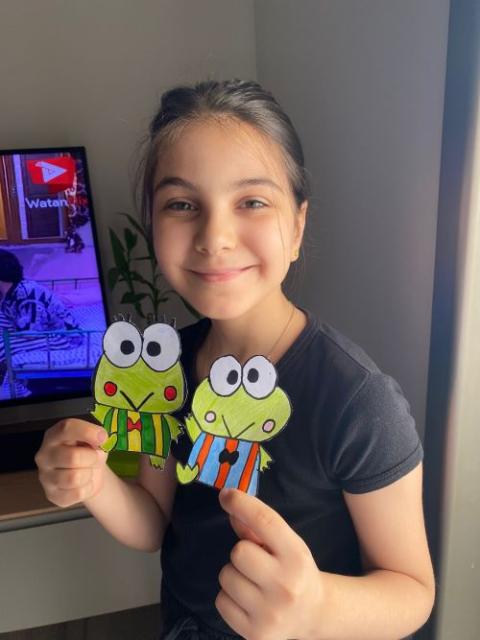
In Palestine, Jude Osaily shares her artistic creations and her hopes for new friends. (Courtesy of Martha A. Kirk)
I showed them the video "A Day in the Life of a Preschooler in Guatemala" and mentioned that they did not have enough food. I showed a film of children from many countries including children in Ukraine whose families have fled violence. Then we explored the many things they might want to express in art and how exciting it would be to share their creations with children around the world.
Matthew understood immediately: His "heart of love" pointed to a world that needs empathetic connection.
In our growing global education project, young people from Guatemala, Ukraine, Mexico, Palestine, Uganda and across the United States — ages 4 to 18 — are creating bridges of understanding and compassion in this online art exchange.
We are inviting young people everywhere to create: to express, to heal, to unite, to hope and to grow together. With parents' permission, creations — pictures, poems, sculptures, songs, dramas or dances — can be uploaded and shared globally.
Young people in Uganda honestly share in their thoughtful pictures and comments: "A mother's smiling face hides a lot of pain within."
Borders and languages are not barriers for these youth, who are building relationships of hope and care. Guided by world history teacher Jacqulyne Esteves, the students in the Earth Angels Club at St. Anthony Catholic High School in San Antonio learned how to say "hello" in Arabic and created a short video to introduce themselves to children in Bethlehem. The Palestinian children at a nature center responded with pictures and comments for an exhibit book, revealing their love of nature and the challenges of caring for God's creation. Sofia Elias, a communications student here at the University of the Incarnate Word, interviewed the student Nathaniel Garcia, the St. Anthony student who compiled the exhibit book. Like Matthew with his heart of love, Nathaniel showed deep care for God's global family.
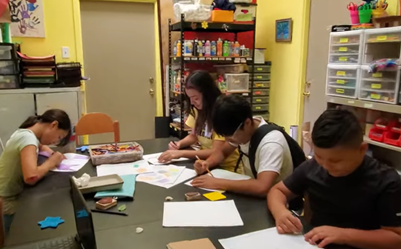
Children create art at Inner City Development in San Antonio. (Courtesy of Martha A. Kirk)
Our Incarnate Word Sisters have long promoted creation care. For the second year, Sr. MaryLou Rodriguez invited students at UIW Brainpower Schools to create art for the Season of Creation to share through Artistic Bridges. At the university, we also hosted a Creation Care Conference with partners in Mexico, Peru, and with the Holy Cross Brothers in Uganda and Tanzania. Both the schoolchildren and university students share a passion for God's creation that can lead us forward.
Support has come from unexpected places. A kind friend, Rotarian and peacebuilder JC Clapsdale, has been driving medical supplies into Ukraine. When he learned about Artistic Bridges, he generously donated art supplies and delivered them to a church refugee center, assisting about 2,000 people displaced by bombs. In their exhibit book, a pediatrician and the pastor's wife describe how art therapy has helped both children and adults express grief and hope. Some drew their fear — but also their hope for their country's future.
In contrast, three exhibit books from Foundation 21 in Monterrey, Mexico, overflow with joy and gratitude. Each year, volunteer university students host a fiesta for children in a disadvantaged town. Asked to create art, the children repeatedly drew pictures of people and things they are grateful for, often simply writing "gracias."
Gratitude has become my personal theme. This year is my 60th anniversary of vows as an Incarnate Word Sister. The words on my cards for my friends are simple: "Grâce à Dieu, Buíochas le Dia, Thank God, Gracias a Dios, Tạ ơn Chúa, Deo gratias."
Artistic Bridges also thrives through the energy of young leaders. Estrella Needham, a University of the Incarnate Word student, received a 2024 Changemaker Grant from Pace e Bene Nonviolence Service. In Guatemala, she worked with two of my former students who founded Little Angels of Mary, a nonprofit serving mothers and children in one of the country's most disadvantaged areas. There, 69% of children have suffered malnutrition. Estrella introduced Artistic Bridges to the preschoolers, and their joyful collection is now part of our online library.
That library continues to grow. Holy Cross Br. Patrick Tumwine, completing a doctorate in education at our university, encouraged teachers at Holy Cross Lake View in Uganda to join. Teenage girls there wrote powerful poems protesting domestic violence. Teacher Sheila Twinomuhangi has been mentoring them, and more contributions are expected soon.
In Hebron, south of Bethlehem, former exchange student Dana Osaily returned home and joined the project. She invited her younger sister Jude to create and involve students from the Hebron Blind Charitable Association's School.
Even adult leaders are discovering the power of art. Sr. Barbara Paleczny, a School Sister of Notre Dame from Canada, once taught religious studies with me at UIW. In her 50s, she turned to painting, finding new energy in creativity. Later, she founded a teachers college in South Sudan with Solidarity with South Sudan, accompanying people in extreme violence and poverty. Many she met had lost 50 or more family members in the ongoing war. She encouraged them to use imagination, music, art and ritual as paths toward healing.
Advertisement
Sister Barbara suggests a simple way to begin Artistic Bridges: Provide art supplies, invite young people to quiet themselves, then prompt gently: "Imagine someone feeling sad. Why are they sad? Draw a picture. … What might help them know someone loves them?" This approach offers safe space for expression.
I often begin in the same spirit, asking people to close their eyes, breathe deeply and notice their feelings. I remind them: feelings are not right or wrong — just real. Expressing them through art can be healing.
For three weeks I had the opportunity to be with Israeli and Palestinian women including Yael Deckelbaum, the Israeli-Canadian singer, who is creating artistic bridges between Israeli and Palestinian mothers. Enough children have died. Now is the time for youth to flourish, to create, to imagine a world where we dance together in circles of hope.
If you know educators or mentors who would like to have a class or group of young people in another country as possible partners for an exchange let us know at [email protected].


